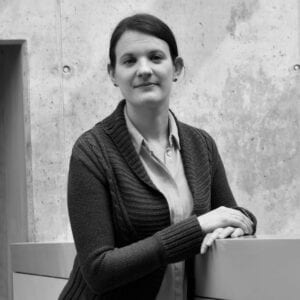In her early 20s, Anna Fodor saw a poster for a job opening as an English teacher in Prague, and she made the move to her mother’s home country–the Czech Republic. She quickly realized that lecturing in front of a room of medical students about confusing, scientific terminology was unfulfilling. Fodor then discovered podcasts, and discovered there are endless stories to share beyond news and politics. She’s now the current affairs editor for Radio Prague, covering sports, history, culture, science, and technology.
 Photo courtesy of Radio Prague International
Photo courtesy of Radio Prague International
What brought you into the journalism field in Prague?
I always liked writing. And luckily, I was writing along the way. So I did have a portfolio when I finally made the decision to go into journalism. I like that I get to learn about lots of different things. I really like talking to people one-on-one, doing interviews. I like working with sound. But just because there’s only five of us on the English language team at Czech Radio, we all kind of have to do everything.
What kind of stories do you like to report on?
I like to write about positive things. I interviewed the granddaughter of the Czech Republic’s only Nobel Prize winner in a scientific subject. She has a super interesting story, because not only is she the granddaughter of this very famous scientist, she’s also half Indian and half Czech, and she grew up under communism. It’s pretty uncommon. Another story I’ve done is about a guy from Belarus who set up a shelter for Ukrainian refugees in what used to be a corner shop.
I think a lot of people, me included, suffer from media fatigue. There is an oversaturation of negativity, so I like to write about solutions. Science stories, especially. I’m pretty interested in clean meat. I recently interviewed the CEO of the only company in Europe that’s making cell-based meat in a laboratory.
What is it like covering science and technology in a very artsy city like Prague?
Culture is very important, but I don’t necessarily see it getting in the way. There’s a huge IT sector here. Lots of international corporations, like Amazon, have offices here in Prague. For a small country, the Czech Republic has a pretty impressive scientific output. Some surprising stuff was invented here, like contact lenses. Considering the disadvantage for the country during communism, where they couldn’t publish in international journals or go to international conferences, they’ve done pretty well. There is a lot of cool stuff going on here.
What cultural differences have you encountered between the Czech Republic and the U.K., and how are they reflected in your work as a journalist?
Political correctness is a cultural difference. In the Czech Republic, sometimes people say things that I find uncomfortable, which is tricky to navigate. Because, I always feel like there’s almost a danger of being a Western imperialist and being like, “No, you have to say these things.” On the other hand, I want to be sensitive to the groups that we’re talking about. I always try in my own work to be politically correct. And sometimes my colleagues ask me, “What’s the right term to use here?” I think you have to be mindful of what you’re putting out there.
After ten years living here, what are your favorite parts of Prague?
I still discover new things all the time. One thing I really appreciate about Prague is it has some great parks, like Grébovka, which has this amazing grotto. I also just love all the cafes. The cafe culture here has always intrigued me because there are all these tiny, independent cafes where you can get a cup of coffee for 40 crowns and sit there for three hours. It’s a really endearing part of Prague.

